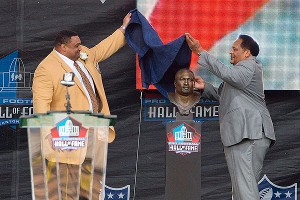I find football players entering the Hall of Fame tend to do it more humble than baseball players -- who act as if they are being anointed to sainthood.
I can see why Willie Roaf is a Hall of Famer today -- he comes from Hall of Fame lineage. You probably will not see this speech anywhere except this story by Wright Thompson. The father was a dentist and the mother, a state Supreme Court justice. The background of many of the family members almost makes Willie Roaf seem like the ne'er do well. AWESOME STORY!!
From ESPN.com:
"One of the things that saddens me is that his mother is not here," he says. "In person ... She's here in spirit. But she did so much for the development of the character of this child, and she put so much into all these children. Even though she was truly an academic and an intellect, she did love sports. And this would just make her heart glow."
The conversation is about to move on, but Cliff is still thinking about the names from Phoebe's prayer, remembering those people, and the ones who came before them, the long lines of invisible ghosts that trail each one of us. He thinks about all of their secret desires and struggles, and what started as a hilarious recounting of Big Willie stories is about to become something else entirely.
"I want you to get the essence of what she just said," he says. "In order for you to understand what she said, I have to go back a little bit in history.""
He apologizes before he even begins, trying to stop himself from turning this into a sermon. The rest of the family sees the passion on his face and falls quiet. The floor is his.
"It starts a long time ago off the west coast of Africa," he says.
He tells of slave ships, people crammed in so tight they couldn't sit up, how the "cargo" was thrown overboard if they got sick or if an anti-slave vessel approached. Sharks, he says, learned to follow the boat, and when he describes it, everyone can see the fins lurking in the wake.
The room is silent.
"When we got to America, we had absolutely nothing," he says. "We had no clothes, no food, no place to go. And now I'm gonna get into my preaching mode. … One of those slaves heard a name, and I don't know what your religious affiliations are, he heard a name called Jesus. Those people that had nothing had God."
His voice cracks for the first time when he says "Jesus."
"And because they called Jesus," he says, his voice cracking again, "we are sitting in this room and Will Roaf is gonna walk across that stage. Because of Jesus. I know there are people who feel so sophisticated and they are so … "
Cliff Roaf is crying.
"We didn't have anything but Jesus," he sobs, "and Jesus answered the prayers starting way back yonder, and when Will Roaf walks across that stage, for the Layton family and the Roaf family, he is a personification of God's majesty. For all of my people that grew up as sharecroppers and woodcutters, for all of those people, Will Roaf is the essence of their hopes, their aspirations, and thankfulness to this entity that we call Jesus. I'm gonna get up, because I get a little bit emotional."
Someone makes a joke about it being dusty in this hotel room.
"No," he says, his voice strong again, "it's not dusty. Ain't no dust in my eyes. It's an emotion of happiness. It's an emotion of thankfulness because this wonderful creator did not forget what he promised to generation after generation after generation. God promised people in our families that if we loved him, and served him, and honored him, he would bring blessings to our children and their children and their children. That is what is the essence of Will Roaf."
Phoebe Layton hugs him. He wipes his eyes with a tissue. He remembers his own father, who worked at a lumberyard, riding a bike or walking every day, making $12 a week. "From my father to me to Will Roaf," he says, "that went to over $4 million a year. Only in America will you have a grandfather making $12 a week to a grandson making millions. Only here in America."
His voice cracks again, and he seems one powerful memory away from being unable to continue. He can see his childhood in rural Arkansas, and the road from those hot fields to a hotel room in Canton.
"See, I'm a cotton chopper," he says, fighting the sobs. "That's what I am. I grew up in a four-room shack. I didn't even have a bed to sleep in. I ate out of pot tops and drank out of jelly jars."
Then he stood up straight and walked out, headed downstairs to a Hall of Fame luncheon with his son -- the grandson of a man who chopped wood for two dollars a day.
'via Blog this'

No comments:
Post a Comment